To be, or not to be on Google Plus, that is no longer the question.
Google Plus is important to Google, and what is important to Google must be important to you (unless, of course, you are a badass, and organic search rankings are too cute for you).

Of course I am joking! All the badasses (in the business world) I know have a Google Plus as well.
I know that non-business users are only trying to resist the way “big bad” Google is using their dependency on it to “push” its social network. But, you Oh Business User must want to rank organically and get other benefits of Google Plus, so why the resistance?
Why you (as a quality Publisher) shouldn’t resist?
Google IS trying to rank the best, most relevant content higher, therefore as publishers, it is your responsibility to not only create high quality content, but (for your own sake) to help Google identify your content as high quality. Presence, and quality participation on Google Plus would help you achieve this and get several other benefits of Google Plus.
Nuff said Publishers, it is high time, stop resisting the change and embrace the benefits of Google Plus. It is way past the time to ‘Wait and See’ how Google Plus works. It must already be an integral part of your digital marketing strategy (hell I know this post is too late). Here are a few reasons why:
Benefits of Google Plus for Businesses
1. High Correlation between Google Plus Ones and Search Rank
The quantity (numbers) and the quality of shares on Google Plus on a particular piece of content were found to have a very high correlation with higher organic search rankings, according to these SEO Ranking Factor Correlation analyses by Search Metrics and MOZ. One thing that should be understood before evaluating any Correlation analysis is that correlation does not imply causation.

Also, in no way does it mean that Google uses number of Plus Ones as a direct metric in its algorithm. A high correlation just means that the posts that ranked higher also had more number of plus ones, compared to those that ranked lower. Also, this correlation was stronger than the other factors considered in both the analyses. It probably stems from the fact that being on Google Plus actively would give some additional SEO benefits (hence, more visibility), which ultimately lead to higher search ranks.
The bottom-line would be to create quality content that is worth being shared on G+ by influential users.
Yes, I know people would try to abuse this, (by adding more people to their circles and also creating dummy accounts, so that their content gets more views and more shares), but so does Google. Therefore, Google states in its User Content and Conduct Policy that adding people aggressively to your Google Plus network is considered Spam. In addition, various other factors affect search rankings, so this really shouldn’t be a biggie.
2. Google Authorship and growing importance of the ‘Author’

Let us begin with the basics – for those of you who do not know yet, Authorship is how you (individuals/authors) claim ownership over their content. This is how it would help:
- It helps authenticate the author and thus the credibility of the content.
- It would ultimately prevent content plagiarism.
- Posts with authorship established reportedly get higher Click-through Rates.
3. Posts with Authorship are recorded to get better search ranks
We have actually seen our clients jump ranks from complete obscurity to Pages 1 and 2 within a matter of weeks after establishing authorship. This can be attributed to the fact that posts with verified authors get better click through rates.
(Of course, the catch remains that you have to create high quality and relevant content. Here’s an example of quality content that beaks away from mundane, while providing value.)
What if you don’t create high-quality content?
At first you might get the benefit of doubt, and consequently rank higher. However, eventually when Google discovers that authorship for you is mere deceit to mask the low quality of your content, you would face the wrath of Google (and lose rank).
And, HOW would Google find out if your Content is low-quality?
Initially, because of authorship, your blog posts look nice and clickable therefore the CTR is higher. The searcher thus clicks through and reaches your blog post. He then discovers that your article doesn’t answer his query, thus bouncing off. The on-site time would consequently be low (signaling low Page Relevance).
Repetitive signals like this and Google would assume that your blog post does not answer the query at hand, and you would eventually be pushed down the search ranks. (Google’s algorithm should consider Good CTRs, high bounce rates and low on-site time in organic rankings as well. This makes sense because CTR and Page Relevance affect Quality Score in Paid Rankings.)
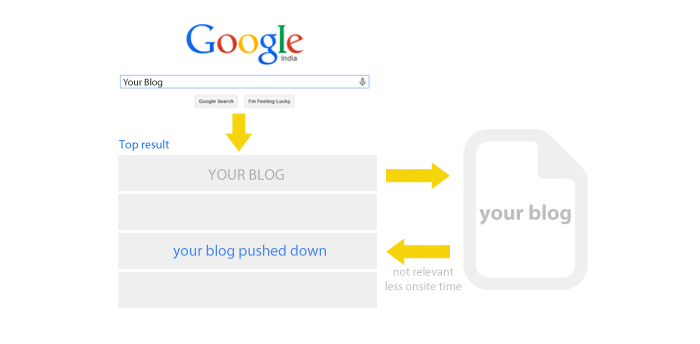
Oh yea, here’s how you can establish the authorship for all your authors.
Side-note: If you want to check how an author’s posts are performing, webmasters allows you to check the performance of the posts for which you are the verified author. This is how it appears:

All said and done, people have still reported no measurable traffic increase after establishing authorship. Reasons can be multiple, from maybe incorrect Authorship implementation, or quality of the content to the quality of the profile picture (yes, has happened).
4. Author Rank
Stems from Authorship, the concept of Author Rank. It is a measure that Google (supposedly) would use to see how credible an author is, and how knowledgeable he/she is in his/her respective domain. So, if you have some expertise, original ideas and blog about them, you would just be on the losing side by resisting Authorship, because Google would not see you as the knowledge authority that you are, thus denying you the praise/ranking that you deserve.
I don’t really have complete clarity of how it is going to work going forward, but for starters, it would definitely help Google separate wheat from chaff. Depending on the social traction (number of Plus Ones) particular author’s posts receive, the frequency of posting valuable content, Google would push his/her posts up, whenever a search query related to what he writes about is made.
There would also be a correlation between the domain authority of sites an author blogs for and his/her author rank, and thus page rank. So, if I blog for a Publisher with high domain authority, like Mashable, then I would have some more credibility in Google’s eyes, and thus better Author Rank. Ultimately, the other websites that I blog for, say LeadSquared, would also benefit from this association and get a better page rank.
In case you are wondering, there is one tool developed by Mark Traphagen that measures AuthorRank. It’s still in beta. You can try it here. You must note that it’s not Google’s Author Rank, but a metric developed by Mark and his team to measure the credibility of authors.
5. Link Juice
This is one of the most important benefits of Google Plus. Unlike Twitter, and other Social Networks out there, the links shared on Google Plus are ‘Do-Follow’, thus giving you a benefit of Rank as well.
Check out the following image of LeadSquared’s Google Plus page. The green highlighted portion represents dofollow links (in case you are wondering, I have used Moz’s toolbar to find the dofollow links). Now, if you know a bit about SEO, you know that dofollow links pass link authority, thus help ranks. No other social platform allows this, so this is a big deal.
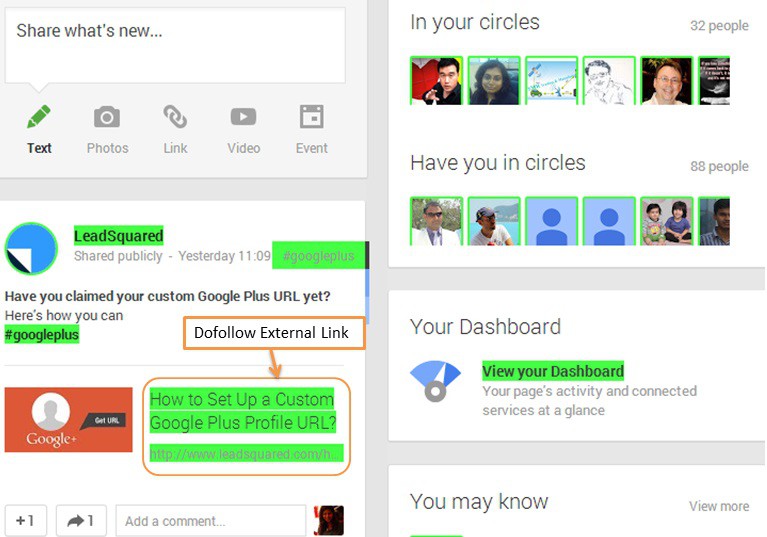
Now, compare this with shares on Facebook page. As you can see, only links within Facebook are dofollow; all the external links are nofollow. Therefore, if you share a link on Facebook, it does not pass link authority to your website.
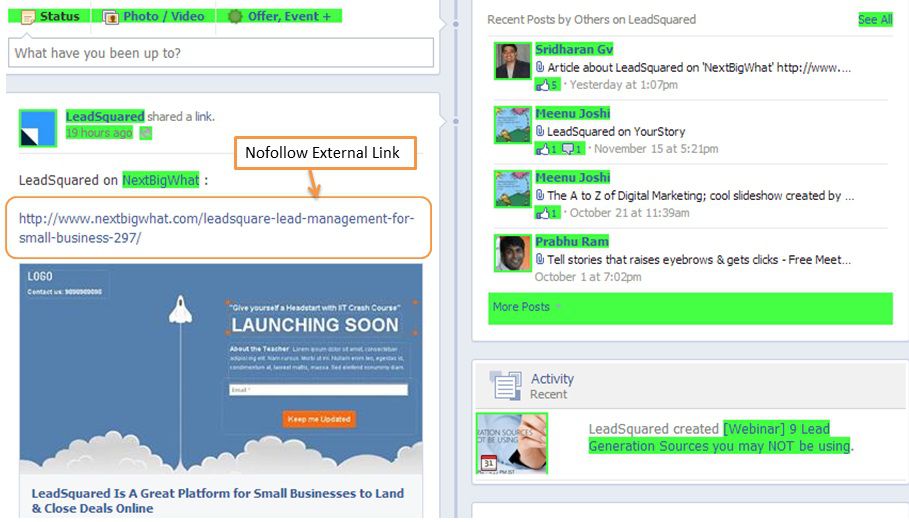
6. Publisher Markup
This is another benefit of Google Plus specific to businesses. Yes, much like Google Authorship, you need to establish yourself as a credible publisher also in the eyes of Google. For this, once again the first step is for your business to be on Google Plus. Having established yourself as a Google Publisher, you get multiple benefits:
i) If someone searches for your business on Google, an information box (pulled from Google Plus Page) like the one you can see in the image below appears in the position where knowledge graph usually appears. Therefore, your presence and interactions on Google Plus would impact how you would appear in Search results. People also have an option of circling you here directly.
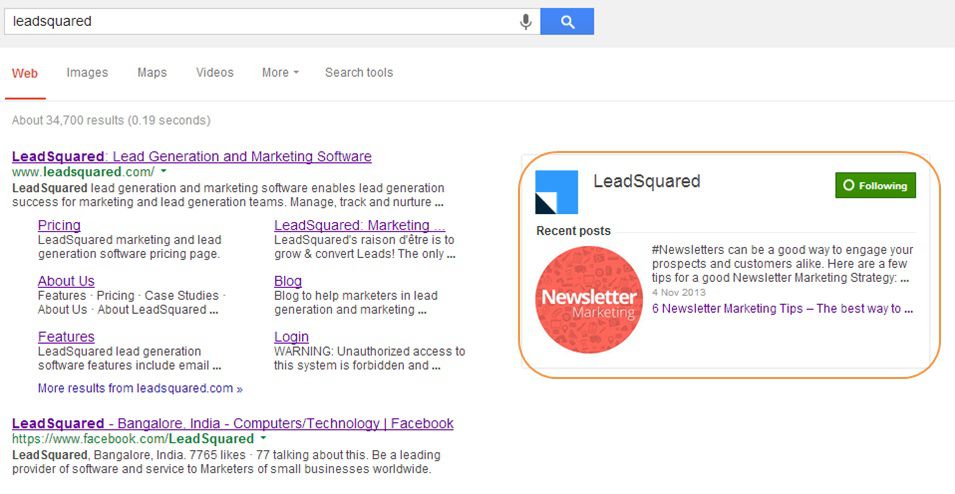
ii) Another very important benefit that you would get with Google Publisher authentication is better credibility in Gmail Inboxes. For instance, email from your company would appear like this in a Gmail recipient’s inbox. As, you can see, on the right side, just above ads, is information pulled from my Google Plus business page.
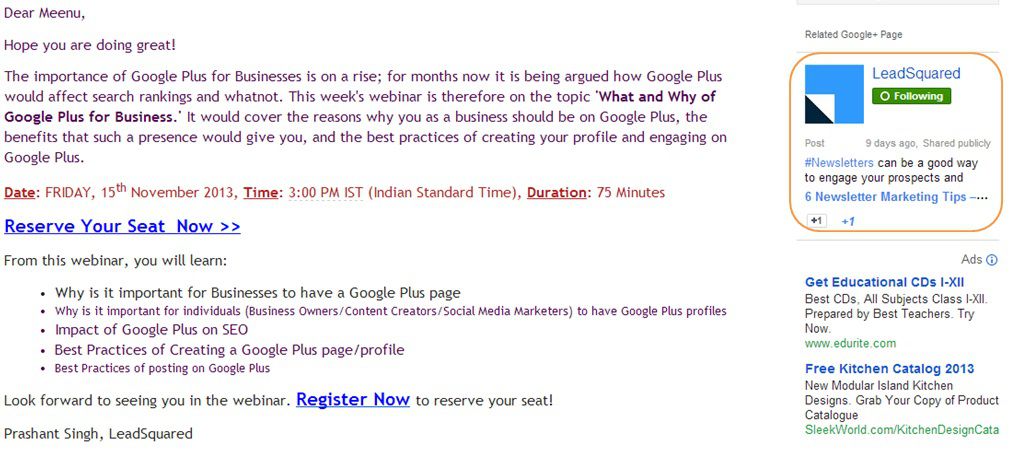
7. Searchable Hashtags
Google has started ranking hashtags mentioned in Google Plus in search results, so if you don’t want to miss this benefit of Google Plus, you should have a page and profile there and participate in the community actively.
8. Social Extensions in your Google Ads
With a linked Google Plus page, you can enable social annotations in your ad campaigns. In case of enhanced campaigns, the annotations appear on their own, whereas in case of non-enhanced campaigns, you would need to link your Google Plus with your Adwords account.
Shared Endorsement is the new addition to the benefits of a link-up between your Adwords and your other Google accounts.
So, this is how they would help – It would work like Facebook’s Sponsored stories. So, the users recommendations, Plus ones etc. would be shown to their friends (whoever they choose to show it to), along with their names and pictures in ads, therefore, working in a word of mouth kind of way. This would help advertisers active on Google Plus, with all the Rich Snippets (Reviews, Local etc.) working. Google takes care of users’ privacy as well, by allowing them to opt out from such endorsements.

Yes, Google wants better CTRs; as Larry (Kim) explains it here, and attributes this to the fact that the average cost of CPCs is down, so by making the ads more attractive, Google wants to leverage the ads. But, it would definitely benefit advertisers as well, because their ads would be more attractive, therefore getting them better CTRs from relevant (more informed, therefore, more interested) visitors.
9. Helps Businesses in Local SEO
i) Local Businesses with a Google Local Page or a Google Places account get organic search placements, for local searches. Given that majority (82%) of online local searchers wind up calling or visiting the local merchant, this is one advantage that you don’t wanna miss (if you are a local business). User reviews can influence the searcher’s decision.
You can create a Google Plus Local page (or, a Google Places account) to get such organic listings. Here’s how you can create one.
ii) A Google Plus Local Page like this can also help local merchants compete with bigger e-tailers. For instance, check out these jewelry shop listings. They appear just below the Sponsored Ads of bigger e-merchants. The best part is that these are free listings.
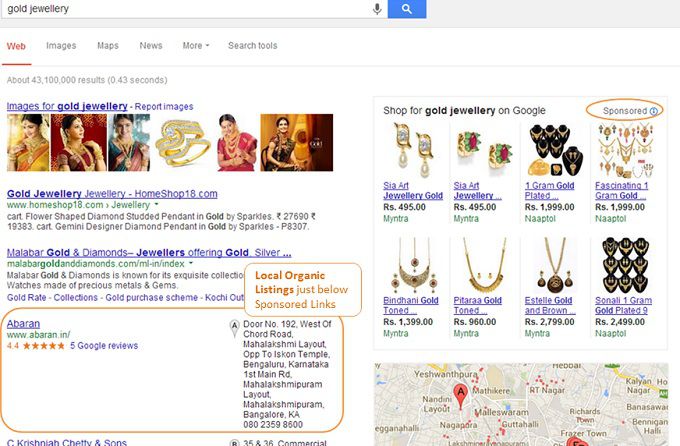
10. Each Post on G+ has its own URL
Unlike any other microblogging or social networking site, each post on Google Plus has a separate URL. This giving businesses and people an opportunity to draft each post as a full-length article. It even has options to customize the content by adding italics, text bold etc.
11. Posts shared on G+ get indexed easily
Once again, unlike other social platforms, like Twitter, that block Google’s crawling activity to some extent, posts shared on Google Plus get indexed almost immediately.
12. Users now need to login to Google Plus to comment on YouTube
And that is not the end of it. A couple of weeks ago, I shared a YouTube video from LeadSquared’s YouTube channel onto my Google Plus profile; that information shows up too in the comments section. So, if someone is engaging with your YouTube content on their G+, it would show up on YouTube as well.
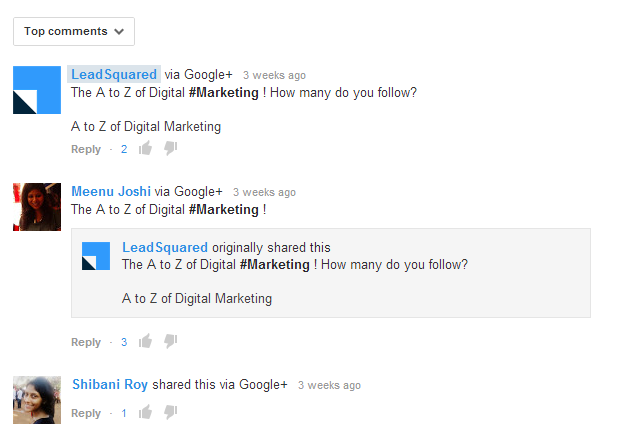
From the user’s perceptive, mandatory sign in to your G+ account to comment on YouTube might irk many regular users. However, it might also make sure that the quality of comments improves; less people would troll using their personal G+ IDs. The users aren’t too happy about it though.
So, alright, I think you have reasons enough to now actually go and create a Google Plus business as well as individual account. If you still have reservations, let us know what they are.









